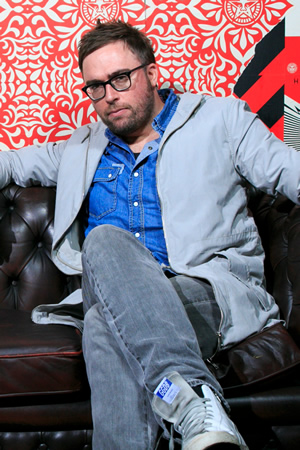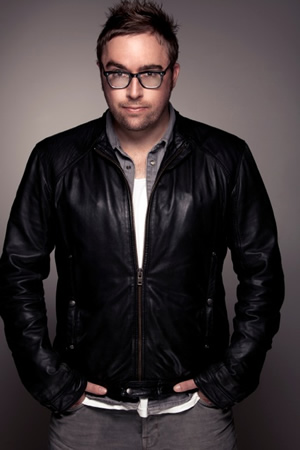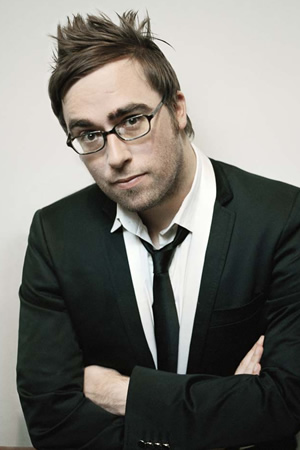Danny Wallace: How to Get Started, From the Man Who's Done Everything

Last week we spoke to Danny Wallace about how Yes Man came about and grew from a random project to become a best-selling book and box office hit.
This time we have the history of Danny's success, as well as insight into an attitude that made success almost inevitable. I came away from chatting with Danny feeling energised. That anything is possible. And I hope it does the same for you!
How did you first get into writing?
It was work experience at school. I was offered terrible opportunities, one involved digging holes in a garden centre, one was filing at an accountant's office... So I said no to the work experience I was offered, and begged my way into the offices of Sega Power Magazine. The staff all seemed to be incredibly confident adults, but in fact were people in their early 20s who couldn't really believe they'd been given responsibility for a magazine which would sell like 120,000 copies. Most of the big magazines now sell 30,000-40,000 copies, so it was a really exciting time.
I would just make myself busy trying to help wherever I could, then one day a reviewer got ill, so they asked if I'd like to review a game, and I said yes! I took it home, played it as much as I could, gave my review in and I was called into the Editor's office. I thought he was going to say "I'm really sorry, but we can't run it" but instead he went "do you want a job?" So suddenly I was a teenager, being given actual money, and free games, which was insane!
Then we got to launch a comedy magazine. It folded pretty quickly because they wanted to do Viz but the whole idea was it was a magazine about comedy, it wasn't a comedy magazine. They made mistakes, and there were hardly any copies in London where all the clubs were. So it was just about to take off, Rik Mayall wanted to be interviewed, and American directors found copies and wanted to be involved, but they pulled the plug. And it was when I was about 18, so I didn't know what to do.
I'd taken a year out from uni, so I found a course in London; my dad found it actually, and recommended it, saying "this sounds like you". And it was a media course. But what I wanted to do was to learn how to make the ideas I was having real. So I was listening to stuff like On The Hour and I had no idea how they could possibly have made On The Hour, it just seemed like it was perfect. How do you even do that? The editing, the ideas, all the characters... I'd been listening to Fawlty Towers which is amazing, but a completely different beast. So I wanted to know how to do that.
So in a sense it was good that the magazine failed for me, because I then when to London where the only people I knew were comedians. They were friends I'd made through this thing, so they were the people I fell in with. So I started writing, and other things, but it was all through video games really.

Do you think it's easier or harder to get into writing now? There are fewer magazines, but with the internet there are fewer barriers to getting out there...
It's easier to get your stuff out there. It's easier to do something, but you have to really care.
The good thing about being paid is that you try to keep the quality up wherever you can, because people are paying you for it, and rightly so, need the quality to be at a certain level. I suppose you can fall into the trap of thinking "that'll do" if it's just you, and your audience isn't quite there yet. So caring about what you do is the most important thing.
Right now it's exciting because you can just record something, write something and get it out there. It's horrible that there are people who want to take advantage of that, people who don't want to pay writers. I still get the odd offer from people launching something who say "It's really exciting, we really want you to write for us... but we can't pay you". And it's like... "well it sounds great, and good luck with it, but writers are professionals, and you should be finding the writers, and paying them. Find someone who's cheaper right now, and make them brilliant."
I do wonder what I'd have done if I could have just made that stuff at home. That's the thing that university gave us access to - a radio studio, and equipment. Digital equipment.
The first show I ever made as a producer for the BBC was on reel-to-reel, which makes me sound 112. But I had to sit there and cut tape with a razor blade and glue it together into the wee small hours. The simplest edit would take ages. And it was a Ross Noble show - his mind's all over the place so I was surrounded by tape just going "where's the thing about the giraffe?". But I'd been trained on digital stuff at university, and I told that to the people at the BBC and they were like "we don't even know what that means". But it soon caught up.
What year was this?
This was 1998/99. So pretty recently. It's weird isn't it? Then obviously digital came in and revolutionised everything and you can make a show in an afternoon that would have taken a week.
But it was nice there. I had an office where there was a high shelf, and out of curiosity one day I went to find what was on the top shelf and it was some awards for The Hitchhiker's Guide To The Galaxy, and an old DAT, and on the DAT was Douglas Adams recording some links or interviews or something around Hitchiker's. I've still got it somewhere. And the awards, I phoned up Geoffrey Perkins, Head of Comedy, and said "I've got some of your awards here". So I took them round to him. You just had that sense of history, being at the BBC of those types of shows being made.
So if you were starting up now, what would you do?
The best advice is to get involved. Things will only happen if you do things.
You can write stuff, you can create stuff - people my age complain that they want to write a book but they can't. And it's like, "you can. It's you. You can do that." You can actually just sit down and start writing. You can create. If you've got an idea that you're really into, and that immediately sparks off a dozen ideas in that minute where you're thinking "oh, this could happen, or this could, or this" then it's down to you, it's your responsibility to make that real.
I say this a lot but I only ever try to go where the fun is. But then, the rule is you have to do that fun well, so that you get asked to have more fun.
I slightly envy those people who find their one path they want to go down. They stick to that path and do it well. And you know where you're going. But I always feel like I'm on a roundabout, and I'm like "oh, look at that, let's go there for a bit!" And you do some radio, and you try to do it really, really well. Or sometimes you'll try this direction, or find a road is closed to you, and then you think, "well, I'll go over here instead". I enjoy that and it works for me. It would be frustrating for some people I think, and I think that going down one path would be frustrating for me.
So if I were starting out, I'd find the thing that you find most fun, but do it well. And care, it's that thing about caring.
I recently spoke with someone and, when I listed all the different things I'm involved with, her advice was to pick one, otherwise no one will take you seriously.
Yeah, she doesn't know what she's talking about. Maybe you will naturally pick one, but if you pick one now it could be a mistake. Do as much as possible really, get a broad base. If you want to do one thing, that will soon present itself, but don't rush it. Have fun. But do it all well. That's what I'd do.
And what qualifies that person to tell you what to do? It's like career advisers, we had a career advisor who would tell everyone what to do, what they thought should be done. And then they got out of careers advice because they realised it wasn't the job for them. That says it all.

You're well known for your regular column in Shortlist magazine. How did that come to fruition?
Ulrika Jonsson's agent was walking around Edinburgh asking people if they knew any funny writers, and my name was mentioned. When they got me in for a meeting, I left my house, looked at the address and realised it was at the end of my road more or less, so I just turned up and they said to me "will you do a guest column?". So I wrote it.
Shortlist was something everyone thought would fail. They were just thinking "It's crazy, because it's free. You're insane." The guys remained steadfast - they believed in it, and it went crazy and is now the biggest men's mag in Europe. Time Out have followed suit and gone free, The Standard's followed suit and gone free, and various other things are going free. And they've maintained a high level of quality. And they're all really nice, and do a good job.
I've been doing it for 8 years, and I was only supposed to do one. They know they'll get it each week, and I know I'll work hard, and we'll make sure it's good enough.
So yeah, I was only supposed to do one, but I've done 400. It's knackering noticing stuff! I've got to notice things all the time!
So do you write stuff down whenever you think "there's a column in that"?
Yeah, although where it goes wrong is when I look at the notes I've got and realise "I've got no idea what this means". So, for example, I'm sure some of these seemed hilarious at the time: "Wrapping people up while they sleep. Hostel, not a hotel. Larry's staying with you."
I lied earlier when I said about the funk thing, because I've got one here that says "near the funk zone". I don't know what any of those are. I should have been far more clear! But generally I'll go "oh, I remember that" and sit down to find the thing about that situation.
How long would that take to write?
It can be really fast, or it can be a little longer. I have to be kind of careful what I say because I don't want them thinking I write them in ten minutes. But it can be all in one go, boom. Or it can be under an hour, or slightly over an hour. But you get into a rhythm.
When you're doing something of a similar length each week you need to be careful of your own ticks and tricks, where you know you can find a laugh, but you've done that before a few times too many. So you then have to find a new laugh, a new rhythm, without repetition so you aren't using the same trick each time. Which is great actually, a real challenge, and you have to stop yourself getting lazy and going "I know how this paragraph should end", and "I know the thing that will make it funny"... I have to find a new way to make it funny for myself.
Every day there's some little idea, some passing phrase... I was talking to Michael McIntyre once about a similar sort of thing - the way he creates his material is he knows there's something in that, he just says it to himself and, by talking about it on-stage, he finds out what that thing is. It might not be ready for a year, sometimes he'll have to put it away until he knows the approach, but he knows there's something in that. That's the key, knowing when there's something in something, and that's really exciting. A) What is it?, and B) How do I use it?
Given this is so close to how stand-ups get material, and considering you've done just about every other job in comedy, why have you never given stand-up a go?
I think you need some time to be rubbish at stand-up. I started off writing for magazines and things, and one of the magazines was a comedy magazine because I was super into comedy.
At that stage I just thought there was no way that I could do what they did. It just seemed impossible. They get up on stage, and say all this stuff, and it's amazing! Where do you even begin? I suppose when I left that magazine would have been a good time to do it, but then people might have gone "Oh yeah, you were a journalist, you wrote about comedy so therefore you think you can do it?" and I'd have been too fragile to take that and would have said "yeah, you're right".

How old were you at that point?
21 or 22? Then I was a producer at the BBC, producing comedy. And then again it would have been a good time to start, but again people would go "oh yeah, you're a producer of comedy so you think you can do it?" And again I'd have been too fragile and gone "Yep, yep you're right".
As you get older you get that confidence, and I've been able to sort of tick that box to a tiny degree by doing live stuff, but it's been about my books, or it's been where I've had to write something on telly or radio or something. So I've been able to get it out of my system a bit. But I've never written a 20-minute-strong set about who-knows-what, it's always been about something I've done, which I imagine would be difficult to do on the circuit.
But, you know it's something... I wouldn't mind doing something like that but it's just... I'm really tired (laughs). I'm really tired now, I've left it so late I'm tired.
When did you first get an agent?
I didn't really know much about that world, I'd dealt with some agents, but they all scared me because I was a producer so I didn't like them or trust them because I didn't feel they had my best interests at heart. Which of course they didn't, it was all about their client, which is the way it should be.
But I'd left the BBC and had started doing Join Me, and this cult thing as a cult leader. And I was offered a deal and I thought I'd best get an agent. So I emailed the first guy I saw who seemed friendly online, a literary agent, and I didn't know how it worked - was I choosing him, or was he choosing me? I didn't understand the dynamics.
I had the meeting and a week passed and I hadn't heard from him. Then another week passed and he emailed me saying "so... am I your agent?" and I just said "I don't know, how does this sort of thing even work?". And he was then my agent, and we went on this little adventure together, so it was sort of cool. But I was just finding my way really.
When you're writing do you work 9-5? Do you have a particular routine?
I've got an office, so I go to my office every day and take it very seriously, but I'll be working on five different things.
I get there for about half 9; take my kid to school then go to the office. Then I work there until I get tired, then I go home, play with my kids, put them to bed, and start again. But it's working really well. I've always worked from home but now I go to an office.
I've been doing a lot of work this year on video games as well, where I've been sort of funnying up the scripts. They just send through - I thought it was going to be like five scripts, but it's ended up being well over 100. It's like working on a film that lasts 10 hours, because there's so many scenes, and so many things that I just had to go in and add jokes. It's great fun, someone's done all the hard work, and now you just get to look at it with a fresh pair of eyes and add jokes. So yeah, so I just try to keep busy.
I'm in a similar position, no idea how anything works, but just sort of muddling on through...
It's not a bad thing to do. Be nice to people, and people will be nice to you. And if they're not, don't talk to them again.
To find out more about Danny visit his website: www.dannywallace.com
Help us publish more great content by becoming a BCG Supporter. You'll be backing our mission to champion, celebrate and promote British comedy in all its forms: past, present and future.
We understand times are tough, but if you believe in the power of laughter we'd be honoured to have you join us. Advertising doesn't cover our costs, so every single donation matters and is put to good use. Thank you.
Love comedy? Find out more
